"Political correctness" is a term used to describe language, policies, or measures that are intended to avoid offense or disadvantage to members of particular groups in society. Since the late 1980s, the term has been used to describe a preference for inclusive language and avoidance of language or behavior that can be seen as excluding, marginalizing, or insulting to groups of people disadvantaged or discriminated against, particularly groups defined by ethnicity, sex, gender, sexual orientation, or disability. In public discourse and the media, the term is generally used as a pejorative with an implication that these policies are excessive or unwarranted.
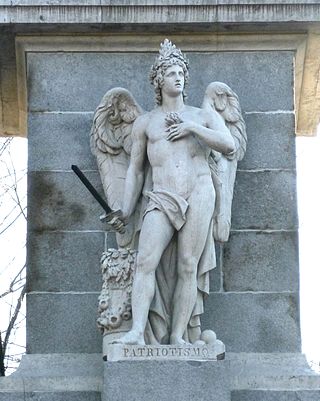
Patriotism is the feeling of love, devotion, and a sense of attachment to a country or state. This attachment can be a combination of different feelings for things such as the language of one's homeland, and its ethnic, cultural, political, or historical aspects. It may encompass a set of concepts closely related to nationalism, mostly civic nationalism and sometimes cultural nationalism.
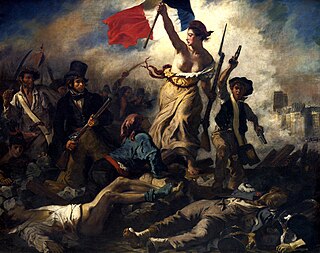
Romantic nationalism is the form of nationalism in which the state claims its political legitimacy as an organic consequence of the unity of those it governs. This includes such factors as language, race, ethnicity, culture, religion, and customs of the nation in its primal sense of those who were born within its culture. It can be applied to ethnic nationalism as well as civic nationalism. Romantic nationalism arose in reaction to dynastic or imperial hegemony, which assessed the legitimacy of the state from the top down, emanating from a monarch or other authority, which justified its existence. Such downward-radiating power might ultimately derive from a god or gods (see the divine right of kings and the Mandate of Heaven).
Civil religion, also referred to as a civic religion, is the implicit religious values of a nation, as expressed through public rituals, symbols, and ceremonies on sacred days and at sacred places. It is distinct from churches, although church officials and ceremonies are sometimes incorporated into the practice of civil religion. Countries described as having a civil religion include France and the United States. As a concept, it originated in French political thought and became a major topic for U.S. sociologists since its use by Robert Bellah in 1960.
Cosmopolitanism is the idea that all human beings are members of a single community. Its adherents are known as cosmopolitan or cosmopolite. Cosmopolitanism is both prescriptive and aspirational, believing humans can and should be "world citizens" in a "universal community". The idea encompasses different dimensions and avenues of community, such as promoting universal moral standards, establishing global political structures, or developing a platform for mutual cultural expression and tolerance.
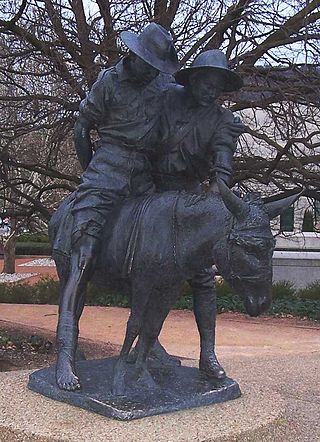
The Anzac spirit or Anzac legend is a concept which suggests that Australian and New Zealand soldiers possess shared characteristics, specifically the qualities those soldiers allegedly exemplified on the battlefields of World War I. These perceived qualities include endurance, courage, ingenuity, good humour, larrikinism, and mateship. According to this concept, the soldiers are perceived to have been innocent and fit, stoical and laconic, irreverent in the face of authority, naturally egalitarian, and disdainful of British class differences.
In politics, a dog whistle is the use of coded or suggestive language in political messaging to garner support from a particular group without provoking opposition. The concept is named after ultrasonic dog whistles, which are audible to dogs but not humans. Dog whistles use language that appears normal to the majority but communicates specific things to intended audiences. They are generally used to convey messages on issues likely to provoke controversy without attracting negative attention.
Social patriotism is an openly patriotic standpoint which combines patriotism with socialism. It was first identified at the outset of the First World War when a majority of Social Democrats opted to support the war efforts of their respective governments and abandoned socialist internationalism and worker solidarity.

The academic boycott of South Africa comprised a series of boycotts of South African academic institutions and scholars initiated in the 1960s, at the request of the African National Congress, with the goal of using such international pressure to force the end to South Africa's system of apartheid. The boycotts were part of a larger international campaign of "isolation" that eventually included political, economic, cultural and sports boycotts. The academic boycotts ended in 1990, when its stated goal of ending apartheid was achieved.
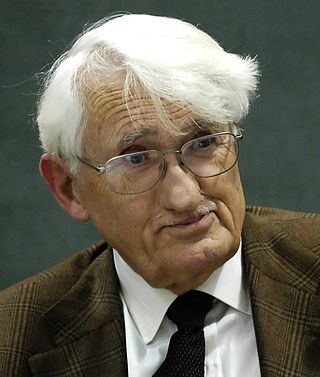
Constitutional patriotism is the idea that people should form a political attachment to the norms and values of a pluralistic liberal democratic constitution rather than to a national culture or cosmopolitan society. It is associated with post-nationalist identity because, while it is seen as a similar concept to nationalism, the attachment is based on the constitution rather than on a national culture. In essence, it is an attempt to re-conceptualize group identity with a focus on the interpretation of citizenship as a loyalty that goes beyond individuals' ethnocultural identification. Theorists believe this to be more defensible than other forms of shared commitment in a diverse modern state with multiple languages and group identities. It is particularly relevant in post-national democratic states in which multiple cultural and ethnic groups coexist. It was influential in the development of the European Union and a key to Europeanism as a basis for multiple countries belonging to a supranational union.
Neo-Zionism is a far-right, ultranationalistic, and religious ideology that appeared in Israel following the Six-Day War in 1967 and the capture of the West Bank and Gaza Strip. Neo-Zionists consider these lands part of Israel and advocate their settlement by Israeli Jews. Some advocate the transfer of Arabs not only from these areas but also from within the Green Line.
Left-wing nationalism or leftist nationalism is a form of nationalism which is based upon national self-determination, popular sovereignty, and left-wing political positions such as social equality. Left-wing nationalism can also include anti-imperialism and national liberation movements. Left-wing nationalism often stands in contrast to right-wing politics and right-wing nationalism.
Among scholars of nationalism, a number of types of nationalism have been presented. Nationalism may manifest itself as part of official state ideology or as a popular non-state movement and may be expressed along civic, ethnic, language, religious or ideological lines. These self-definitions of the nation are used to classify types of nationalism, but such categories are not mutually exclusive and many nationalist movements combine some or all of these elements to varying degrees. Nationalist movements can also be classified by other criteria, such as scale and location.

Thinethavone "Tim" Soutphommasane is an Australian academic, social commentator and former public servant. He was Australia's Race Discrimination Commissioner at the Australian Human Rights Commission from 2013 to 2018. He has previously been a political staffer for Bob Carr, a columnist with The Age and The Australian newspapers, a lecturer at Sydney and Monash Universities, and a research fellow with the Per Capita think tank. He is a member of the board of the National Australia Day Council, and an ex officio member of the Council for Multicultural Australia.

Blue Labour is a British campaign group and political faction that seeks to promote blue-collar and culturally conservative values within the British Labour Party – particularly on immigration, crime, and community spirit – while remaining committed to labour rights and left-wing economic policies. It seeks to represent a traditional working-class approach to Labour politics.

The Narrative of John Smith (2011) is a novel written in 1883 by Arthur Conan Doyle, published posthumously by The British Library. In a work of narrative fiction, Doyle writes from the perspective of a middle-aged bachelor named John Smith recovering from rheumatic gout. Unlike his later work in detective fiction, fantasy, and science fiction, this novel unfolds through a series of tangential, essay-like thoughts stemming from observations on everyday life. The subjects are of a “personal-social-political complexion”.

Proletarian internationalism, sometimes referred to as international socialism, is the perception of all proletarian revolutions as being part of a single global class struggle rather than separate localized events. It is based on the theory that capitalism is a world-system and therefore the working classes of all nations must act in concert if they are to replace it with communism.

Woke is an adjective derived from African-American Vernacular English (AAVE) originally meaning alertness to racial prejudice and discrimination. Beginning in the 2010s, it came to be used as slang for a broader awareness of social inequalities such as racial injustice, sexism, and denial of LGBT rights. Woke has also been used as shorthand for some ideas of the American Left involving identity politics and social justice, such as white privilege and reparations for slavery in the United States.
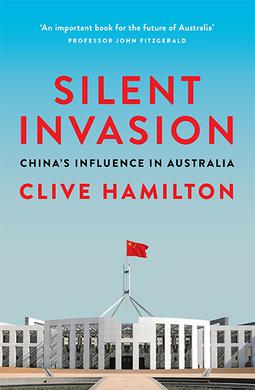
Silent Invasion: China's Influence in Australia is a 2018 book by Clive Hamilton and is about the growing influence of the Chinese Communist Party (CCP) in Australian politics and civil society. The book details systematic attempts by the government of the People's Republic of China to expand its influence and espionage network in Australia. The author alleges that this is causing "the erosion of Australian sovereignty".

Transpacific Antiracism: Afro-Asian Solidarity in 20th-Century Black America, Japan, and Okinawa is a 2013 non-fiction book by Yuichiro Onishi, published by New York University Press. It details relations between African-Americans and Japanese people in civil rights issues.











